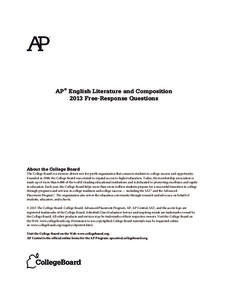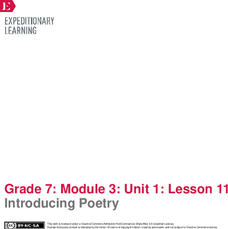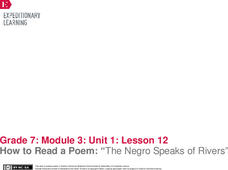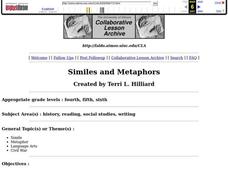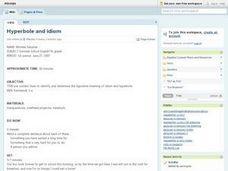Wordoful.com
List of Idioms and Phrases
Good idioms are a dime a dozen. A 19-page list is only a drop in the bucket when it comes to figurative language and idiomatic phrases. So don't get a chip on your shoulder and dive in; learning what idioms really mean is a piece of cake!
Read Works
Spring
Celebrate the season of spring with a poem. After reading a four-stanza poem about the season, sixth grade readers respond to 10 reading comprehension questions that have them thinking about the purpose, imagery, and other types of...
California Education Partners
Gettysburg Address
Looking for an assessment that reveals how well readers understand complex text? Check out an assessment module based on "The Gettysburg Address." Pupils are asked to craft an essay that demonstrates their understanding not only of the...
Penguin Books
An Educator’s Guide to Savvy by Ingrid Law
Literature circles give learners a chance to explore a novel in a unique way. An educator's guide for the book Savvy uses literature circles as part of the novel study. Additional activities cover elements of figurative language and...
College Board
2013 AP® English Literature and Composition Free-Response Questions
Is there a moment that changed your life? Readers analyze novels and plays to discover the moments in which characters change from children to men. Writers also create essays to analyze literary devices used in The Rainbow and figurative...
EngageNY
Introducing Poetry
A silent reading session permits class members to meet individually with their teacher to discuss their text. Learners then discuss and express their observations about two poetry quotes, recording thoughts about craftsmanship, forms of...
EngageNY
How to Read a Poem: “The Negro Speaks of Rivers”
Learners listen as a teacher models how to read a poem using The Negro Speaks of
Rivers. They use the How to Read a Poem anchor chart to help guide their thought process on how a poem requires different reading than other text. While...
Curated OER
Figurative Language Lesson
Seventh graders write figurative descriptions of common objects using complete sentences. They read and interpret the figurative language of a poem.
Curated OER
History Personified
In 1856 Congressman Preston Brooks of South Carolina beat Senator Charles Sumner of Massachusetts over the head with a cane. This event, which highlighted the acrimonious debate over the expansion of slavery, is the focus of a paper...
Curated OER
Deciphering the Mechanics of Poetry
After a review of poetic terms, groups are given an object and they create a poem using a simile, a metaphor, internal rhyme, end rhyme, alliteration, and personification. Groups then exchange objects and repeat the process. Consider...
Curated OER
Image as Metaphor
A Dorothea Lange photograph launches this study of metaphors. Using the questions provided, the class examines the image and the title to consider how Lange uses her photo as a metaphor. Class members then select an object they can use...
Curated OER
Idioms
Here is a simple list of 21 idioms for which learners are supposed to write the figurative meanings. I'd extend it to include either drawing pictures or group discussions to build meaning rather than just assigning it as individual work.
Curated OER
Similes and Metaphors
Use the Civil War and important figures from that period to help your class write poetry. You'll need to create a list of similes and metaphors, but you could also consider having your learners create this the day prior. They will use...
Curated OER
My Monster
Explore descriptive language. Learners read a series of similes describing the eyes, teeth, skin, and other features of a monster. Then, they describe their own imaginary monster using similes and adjectives. Very creative!
Curated OER
Personification
The meaning of personification is the focus of this language arts presentation. Upper elementary writers are exposed to the concept of personification, then practice implementing the technique by adding color to the sentence, "Leaves are...
Curated OER
Dear Diary
Work on narrative writing with this lesson, in which middle schoolers analyze the characters from a selected piece of literature and write narrative diary pieces as the character. They work to understand the point of view of the...
Texas Education Agency (TEA)
How to Read and Analyze a Poem (English III Reading)
A poem is compressed speech, like a can of frozen juice with all the water pressed out. An interactive teaches users how to reconstitute the language, the structure, and the literary devices to appreciate all the subtleties the poet...
Curated OER
Figurative Language in Poetry and Prose
Students examine the impact of sound devices in poetry. In this poetry lesson, students read the listed poems and identify uses of hyperbole, simile, metaphor, imagery, and personification. Students discuss how sound devices enhance poetry.
Curated OER
Shakespeare's Othello and the Power of Language
Students explore the basis of Iago's persuasive power by analyzing Shakespeare's use of rhetoric and figurative language. In this Othello instructional activity, students analyze Iago's rhetoric in monologues and dialogues with other...
Curated OER
Language Arts: Awesome Authors Website
Students examine the writing techniques of professional authors and apply them to their own work. In pairs, they email authors to discover the tricks of the trade. Students create their own Website for their work.
Curated OER
Hyperbole and Idiom
Seventh graders use context clues to determine the figurative meaning of idioms and hyperboles. They practice writing idioms and hyperboles in sentences about real life situations around them. This lesson is a good way to improve variety...
Ohio Department of Education
A Glossary of Literary Terms
If you're tired of defining allusion, onomatopoeia, and satire for your language arts students, hand out a complete list of literary devices to keep the terms straight. Each term includes a definition that is easy to understand and...
Curated OER
Geo Jammin' By Design - Day 7, Lesson 38: Kool Cups
Create geometric cups by interpreting directions, informational text, and mathematical concepts. Critical thinkers apply geometric theory (congruent shapes, patterns, symmetry) to actual directions to create a cup that holds Kool Aid....
Curated OER
Metaphors Are Like Similes...Right?
Build the basis for critical thinking by increasing mastery of metaphors, similes, and analogies. Clear up the confusion that often marks lessons on figurative langauge. A very insightful article, full of great links.
Other popular searches
- Figurative Language Poetry
- Figurative Language in Poems
- Figurative Language Quiz
- Figurative Language Project
- Imagery Figurative Language
- Figurative Language Lessons
- Using Figurative Language
- Figurative Language Worksheets
- Figurative Language Test
- Figurative Language in Poetry
- Figurative Language Vocabulary
- Figurative Language in Prose






